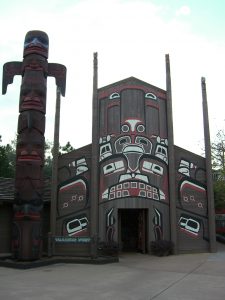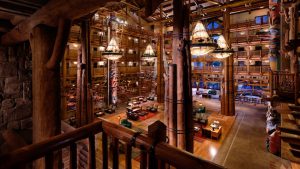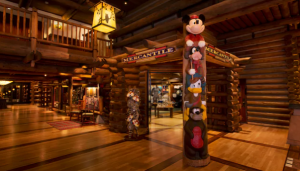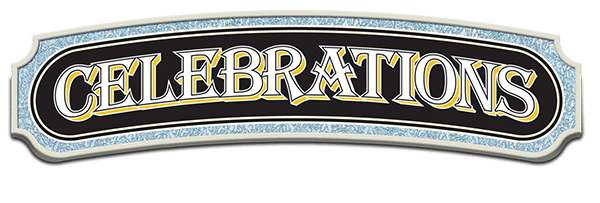5 Little Known Facts About the Totem Poles of Walt Disney World

Earlier this year, Epcot’s Canada Pavilion debuted two new totem poles carved by Tsimshian artist David A. Boxley. Each tells a cultural story, one about Eagle and another about Killer Whale, both prominent figures in the tribal legends of the Pacific Northwest. The debut of the totems was celebrated with performances by Boxley and the Git Hoan (People of the Salmon) Dancers.
Boxley designed the totem poles with his son David R. Boxley at his studio in Lynnwood, Washington. This new work continues a relationship with Disney that stretches back almost two decades. In honor of the new additions to the Canada Pavilion, here are five little known facts about the history of totem poles in the Walt Disney World parks.
1. Totem Poles Have Been Part of Walt Disney World Since It’s Opening
There have been totem poles at the Walt Disney World Resort since its opening in 1971. The original totem poles sat in Frontierland at the Magic Kingdom. The poles did not tell a story and were not authentic to any tribe, instead depicting a stereotypical Hollywood/Old West style version of Native culture.
Photographs from the early and mid-1970s show the totems sitting between the train tracks and Rivers of America.
2. The Canada Pavilion’s Original Totem Poles Were Fiber-Glass
They were designed by Disney Imagineering and, like the original Frontierland totem poles, did not adhere to any specific tribe’s design. The Imagineers tried to capture the spirit of the indigenous peoples of the Northwest, specifically the First Nations people of Canada. Rather than carving them in wood, Imagineers made the totems out of fiberglass. When Disney installed an authentic totem pole in the late 1990s, they immediately realized that their pieces appeared cartoonish in comparison.
3. Canada’s First Authentic Totem in Epcot was Carved Live for Guests

In 1998, Disney decided to make the native portions of the Canada pavilion more authentic. They contacted the mayor of a Tsimshian village called Metlakatla on Annette Island at the southern end of the Alexander Archipelago. When they asked him to recommend an artist, the Mayor suggested David Boxley.
Boxley began studying Tsimshian carving and arts in 1979, and made it his full time career in 1986. By the time Disney came calling he had established himself as an artist of note, having contributed his work to events such as the 1990 Goodwill Games between the United States and the USSR.
“I went out to Orlando and met with the Imagineers,” Boxley said. “The wanted a quality carver who could also be amicable talking to guests while creating the totem pole. They liked me and the process began. I found a 30 foot, old growth cedar log on the Olympic Peninsula in Washington through a friend who ran a cedar mill. It was prepared and shipped by truck to Florida, and I flew out too after Disney built a covered carving “shed” next to the Canada Pavilion.”
The carving process took two months to complete. During the first month, Boxley worked Monday-Friday, using his free time to explore the parks (including a sneak peak at Animal Kingdom shortly before it opened). The following month, Boxley changed his working schedule to seven days a week to make sure that he finished on time.
“It was a really fun experience,” Boxley said. “The Disney Imagineers treated me great, the young people working at the Canada Pavilion were so helpful in talking to guests and assisting me whenever I needed them. Thousands of guests stopped by to watch and ask questions. Even had visits from Imagineers and higher-ups at Epcot who got to try their hand at carving.”
The pole tells an ancient story common among Pacific Northwestern tribe. In the legend, Raven steals light from the Sky Chief and gives it to humanity.
4. The Large Totems in Wilderness Lodge Originally Violated a Cultural Taboo

Pacific Northwestern artist Duane Pasco carved two 55 foot totem poles for the lobby of the Wilderness Lodge resort. The process of carving the poles took approximately six months and was completed by Pasco and three assistants in early 1994. Each pole consists of two 27 foot long pieces, five feet in diameter at the base. The cedar totems each tell a story, one about Raven and another about Eagle. The stories are not specific to any one tribe, but capture what Pasco described as a “pan-coastal” design, in a deliberate attempt not to depict stories that may have been inherited or held in private ownership by a tribe or clan.
Despite this cultural sensitivity, the totem poles were originally placed facing each other directly. In many native cultures, this suggests a sense of conflict. To correct this, Disney offset the two poles so that they look slightly past each other.
5. Artist William Robinson Designed a Character Themed Totem Pole

In the 1950s, Disney created a foolish brown bear named Humphrey who appeared in Goofy and Donald Duck cartoons, before starring in his own series of animated short films. Jack Hannah (later of Hannah-Barbera) directed a number of the Humphrey cartoons before the character drifted into obscurity.
Several decades later, Humphrey re-emerged, appearing in popular Disney programs like Goof Troop and Chip and Dale Rescue Rangers. In 1994, he became the official spokes character of the newly opened Wilderness Lodge. Artist William Robinson added him to a whimsical totem pole in front of the resorts Merchandise Store. Humphrey sits at the base of the pole, holding up frontier clad versions of Goofy, Donald Duck, and Mickey Mouse. It took Robinson several months to complete the piece and, like the more authentic poles in the resort lobby, it was carved in cedar.
